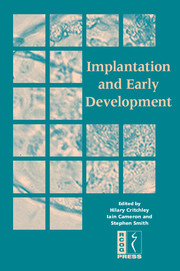Book contents
- Frontmatter
- Contents
- DECLARATION OF INTEREST
- Participants
- Preface
- SECTION 1 PREPARATION FOR IMPLANTATION – THE UTERINE ENVIRONMENT
- SECTION 2 THE EMBRYO
- SECTION 3 LESSONS FROM ANIMAL MODELS (TRANSGENICS) AND NOVEL TECHNOLOGIES
- SECTION 4 CLINICAL SEQUELAE
- SECTION 5 CONSENSUS VIEWS
- 23 Consensus views arising from the 48th Study Group: Implantation and Early Development
- Index
23 - Consensus views arising from the 48th Study Group: Implantation and Early Development
from SECTION 5 - CONSENSUS VIEWS
Published online by Cambridge University Press: 05 June 2014
- Frontmatter
- Contents
- DECLARATION OF INTEREST
- Participants
- Preface
- SECTION 1 PREPARATION FOR IMPLANTATION – THE UTERINE ENVIRONMENT
- SECTION 2 THE EMBRYO
- SECTION 3 LESSONS FROM ANIMAL MODELS (TRANSGENICS) AND NOVEL TECHNOLOGIES
- SECTION 4 CLINICAL SEQUELAE
- SECTION 5 CONSENSUS VIEWS
- 23 Consensus views arising from the 48th Study Group: Implantation and Early Development
- Index
Summary
Keywords
Information
- Type
- Chapter
- Information
- Implantation and Early Development , pp. 283 - 286Publisher: Cambridge University PressPrint publication year: 2005
